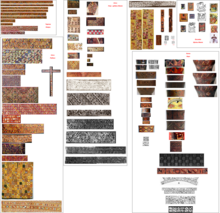Tocapu

Tocapu (Tocapo or Tokapu) was a decorative artwork with discrete geometrical motifs. It was associated with Andean textiles, especially for the use of the Royals' clothing. Tocapu was also painted on wooden boards.
Motifs[edit]
Tocapu was an integral part of the various textiles used in the Inca Empire. The designs were woven into the fabrics. In Tocapu, a nearly square frame inside a field is divided and subdivided into various geometric shapes.[1]
Repeat Setting[edit]
A repeat of the designs was combined following the suitability, for example, of repeating the single design unit or forming a group of units, such as a band (for example, a band on the bottom of uncu) or sometimes Tocapu motifs were given in a scattered way also (without any arrangement).[1]
Study[edit]
Tocapu used by Incas always remained a subject of research for assuming the existence of pictographic or ideographic writing.[2][3]
About symbols and signs[edit]
The Tocapu is evaluated more than decorative values.
Santacruz Pachacuti Yamqui himself explained
each town was referred to by a sign system well recognized in the Andes, the pacarina. Manco Capac is credited with originating this custom whereby each province and each town chose an object to symbolize its origin.
Signs, songs, and memory in the Andes : translating Quechua language and culture[4]
Gallery[edit]
-
Uncu with Tocapu
-
Uncu with Tocapu
-
Inca Tunic, 15th-16th Century
-
-
Paracas mantle, c. 200 C.E., Larco Museum, Lima.
-
-
References[edit]
- ^ a b Phipps, Elena (2004). The Colonial Andes: Tapestries and Silverwork, 1530-1830. p. 8.
- ^ Clados, Christiane (2019). "Borrowed from the Ancestors: Tiwanaku and Wari Motifs in Inca Tocapus". Baessler-Archiv (65): 35–50.
- ^ Silverman, Gail P. (2008). A Woven Book of Knowledge: Textile Iconography of Cuzco, Peru. University of Utah Press. p. 25. ISBN 978-0-87480-909-1.
- ^ Harrison, Regina (1989). Signs, songs, and memory in the Andes : translating Quechua language and culture. Internet Archive. Austin : University of Texas Press. p. 60. ISBN 978-0-292-77627-2.













